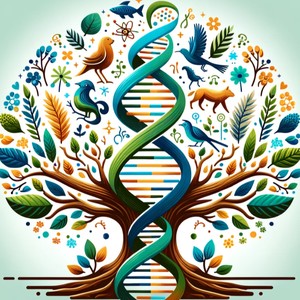Koi Fish: Sacred Symbol or Cultural Myth?
Nov 25, 2024
Explore the truth behind koi fish symbolism across cultures. This video examines the origins of koi's cultural significance in Japan and dispels the myth of their universal sacred status. Learn how this misconception spread globally and gain insights into the varied perceptions of koi fish in different societies.
View Video Transcript
0:00
koi fish sacred symbol or cultural myth
0:03
koi fish with their vibrant colors and
0:06
graceful movements have captured the
0:09
imagination of people worldwide but are
0:11
these beautiful creatures truly revered
0:14
as sacred in all cultures let's dive
0:16
into the fascinating world of koi fish
0:18
and unravel the myths surrounding their
0:20
Universal sacredness koi fish also known
0:23
as mishik GOI are ornamental varieties
0:26
of the common carp these colorful fish
0:29
have become popular in ornamental ponds
0:31
and Water Gardens across the globe their
0:33
association with cultural significance
0:35
has led many to believe that koi are
0:37
universally regarded as sacred however
0:40
this widespread notion is more myth than
0:43
reality the cultural importance of koi
0:45
fish can be traced back to Japan where
0:47
they hold a special place in folklore
0:49
and symbolism in Japanese culture koi
0:52
are indeed considered auspicious and are
0:54
often associated with perseverance
0:56
strength and good fortune the legend of
0:59
the koi fish swimm upstream and
1:00
transforming into a dragon has become a
1:02
powerful metaphor for overcoming
1:04
obstacles and achieving success while
1:07
koi fish are highly regarded in Japan
1:09
their status in other Asian cultures
1:11
varies in China for example carp are
1:14
seen as symbols of good luck and
1:16
prosperity but the specific ornamental
1:19
koi varieties do not hold the same level
1:22
of cultural significance as they do in
1:24
Japan in Korea carp are also associated
1:28
with Good Fortune but again the emphasis
1:30
is not specifically on koi fish the
1:34
misconception that koi fish are
1:35
universally sacred likely stems from the
1:38
global popularity of Japanese culture
1:40
and the widespread adoption of kond in
1:43
various parts of the world as Japanese
1:45
Gardens and Aesthetics gained
1:47
International appeal the symbolic
1:49
meaning of koi fish was often adopted
1:52
without a full understanding of its
1:54
cultural context it's important to note
1:57
that in many Western cultures and other
1:59
parts to the world koi fish are
2:01
primarily appreciated for their beauty
2:03
and as decorative elements in gardens
2:05
and ponds while some individuals may
2:08
attribute spiritual or symbolic meaning
2:10
to koi this is often a personal
2:13
interpretation rather than a culturally
2:15
ingrained belief the spread of this myth
2:17
can be attributed to several factors the
2:20
internet and social media have played a
2:22
significant role in disseminating
2:25
information about koifish symbolism
2:28
sometimes without proper culture Al
2:30
context Additionally the commercial
2:32
popularity of koi fish in the
2:35
aquaculture and ornamental fish trade
2:38
has led to marketing strategies that may
2:41
exaggerate or misrepresent their
2:43
cultural significance understanding the
2:45
true cultural context of koi fish
2:48
reminds us of the importance of Cultural
2:50
Literacy while koi fish are indeed
2:53
significant in Japanese culture their
2:55
sacred status is not Universal this
2:58
realization encourages us to appreciate
2:59
appreciate the nuances of different
3:01
cultural symbols and void
3:03
overgeneralizing their meanings across
3:05
diverse Societies in conclusion while
3:08
koi fish are undoubtedly beautiful and
3:10
culturally significant in Japan the
3:13
notion of their Universal sacredness is
3:15
a minute by recognizing the specific
3:17
cultural contexts in which koi are
3:20
revered we can better appreciate the
3:23
rich tapestry of symbolism that exists
3:26
across different cultures worldwide
#Arts & Entertainment
#Biological Sciences
#Fishing

